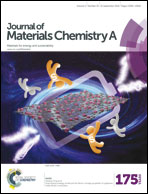Ionic liquid-based electrolytes for “beyond lithium” battery technologies
Abstract
Growing energy demands and the shift to renewable energy sources will result in increased need for efficient energy storage. To anticipate and satisfy these demands, electrochemical energy storage technologies beyond those based on lithium chemistries are being explored. These “beyond lithium” battery technologies, which are based on metals such as sodium, magnesium, aluminum and zinc, have advantages particularly in terms of raw material abundance and cost, but are still in the early stages of research and development as compared to lithium-ion batteries. One of the significant challenges common to all these technologies is the development of safe and reliable electrolytes. Here, an overview of the use of ionic liquids (IL) as electrolytes for “beyond lithium” battery technologies is provided. The current state of IL-based electrolytes is presented for several different battery chemistries. The advantages of ILs and challenges from the perspective of the electrolyte are emphasized. The idea of electrolyte development based on understanding of why they work the way they do is highlighted.


 Please wait while we load your content...
Please wait while we load your content...